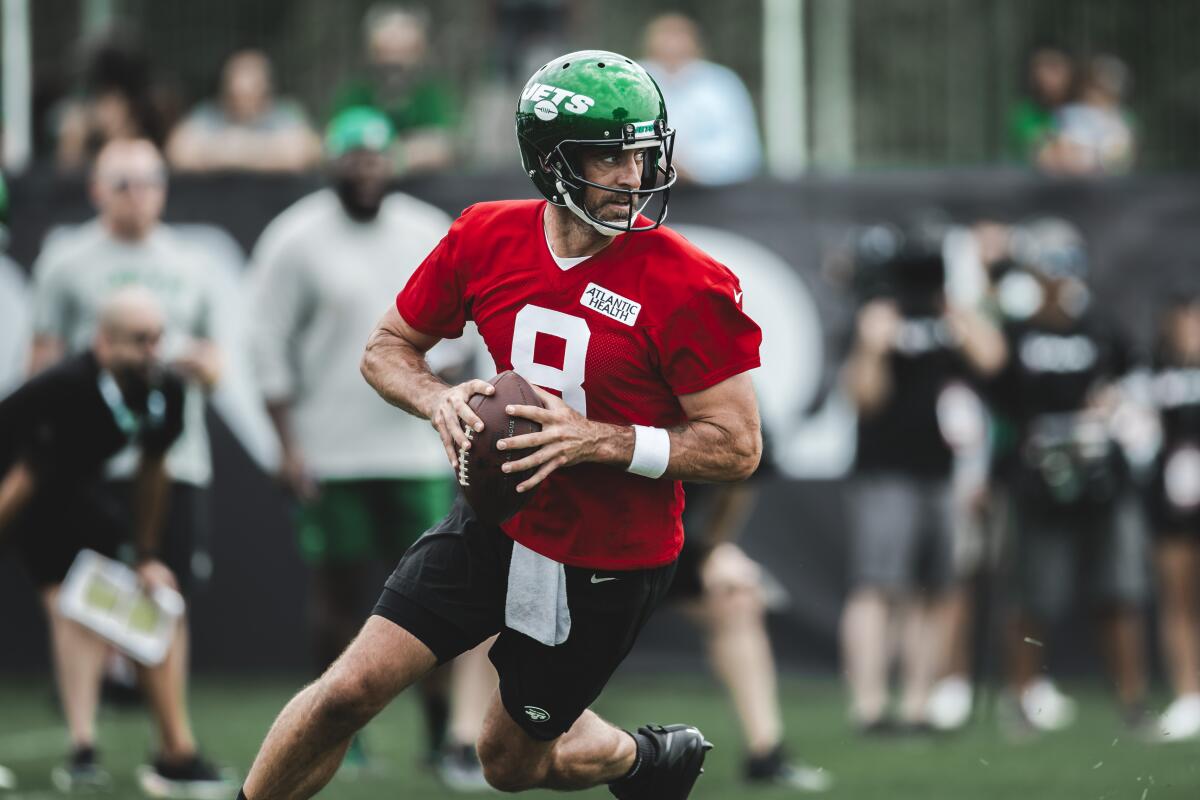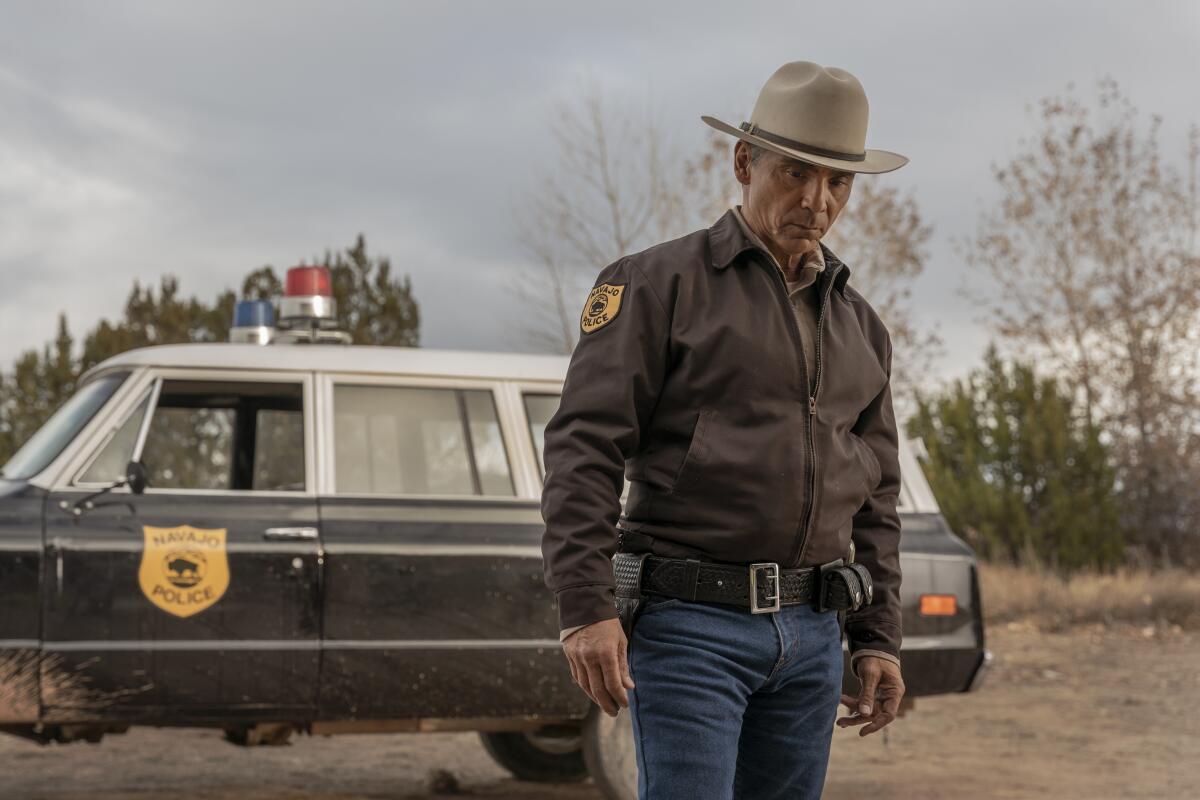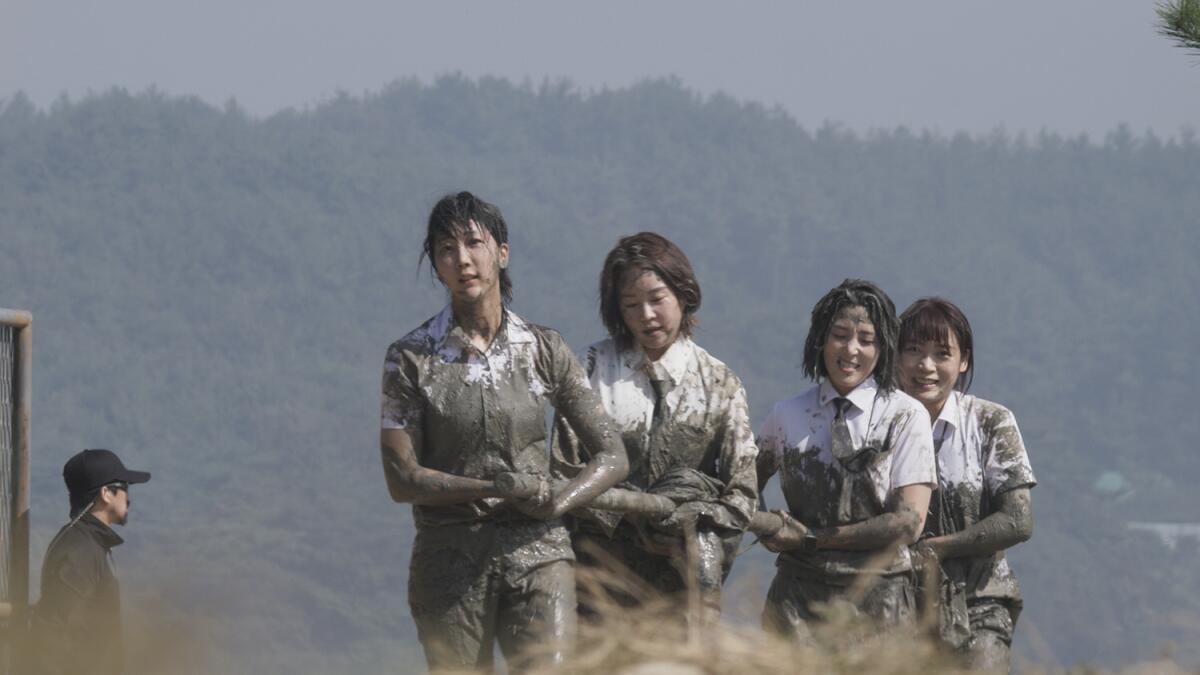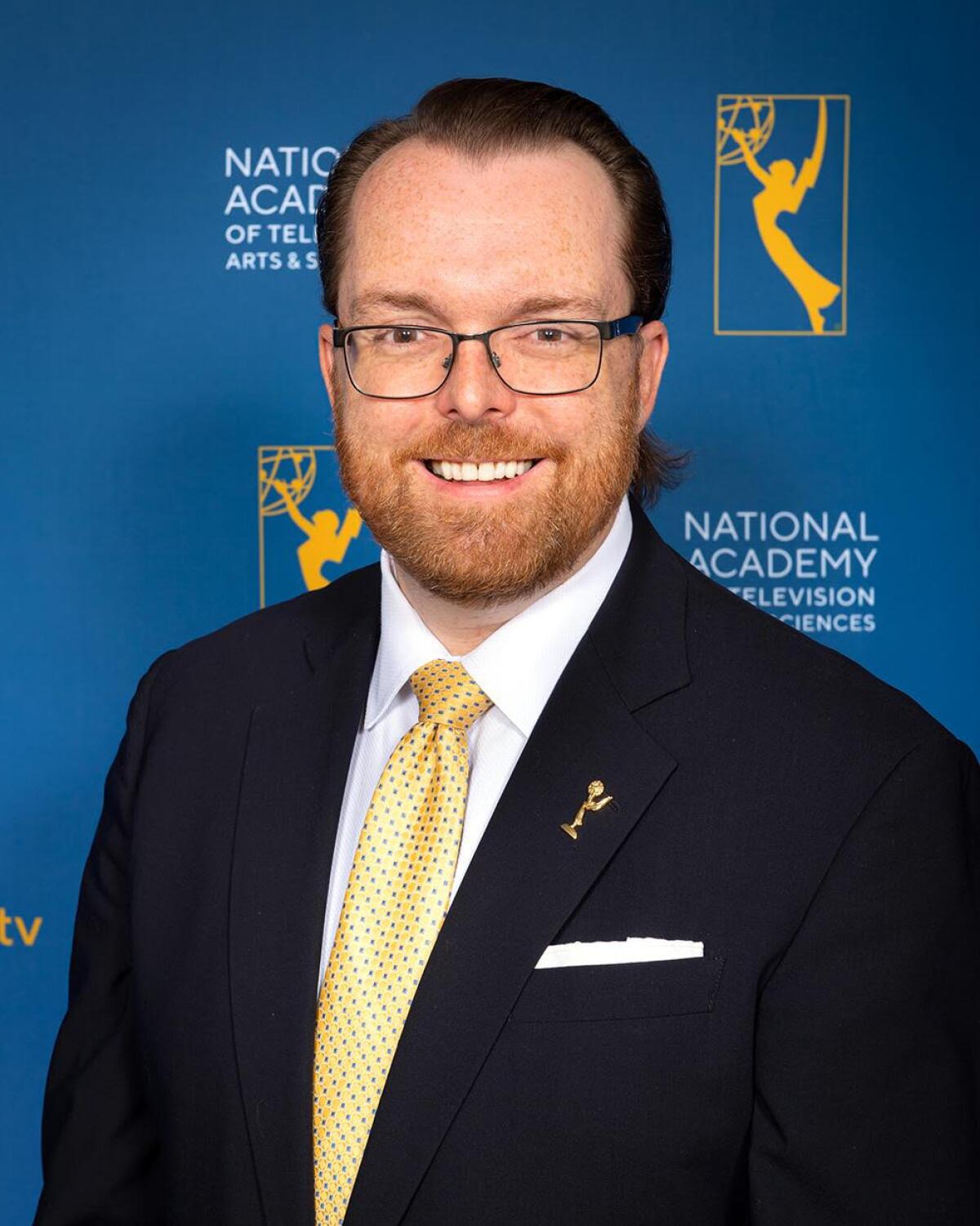NFL docuseries ‘Hard Knocks’ has become a big snooze. Here’s what to watch instead

Welcome to Screen Gab, the newsletter for everyone who knows there’s nothing more frustrating than being a fly on the wall to a PR campaign.
As audience engagement editor and avowed football fanatic Vanessa Franko writes in this week’s Catch Up, the kid-gloves approach to new (and not uncontroversial) quarterback Aaron Rodgers has made the current New York Jets-focused season of “Hard Knocks” a bore — and she recommends a little replacement therapy as you gear up for the start of the regular season.
Also this week, guest National Academy of Television Arts & Sciences President and CEO Adam Sharp discusses the diversity of the organization’s judges and Times staffers recommend a gripping Korean reality competition and a tense Navajo noir.
The complete guide to home viewing
Get Screen Gab for everything about the TV shows and streaming movies everyone’s talking about.
You may occasionally receive promotional content from the Los Angeles Times.
ICYMI
Must-read stories you might have missed

Mugshots from Georgia and the first GOP debate upstage Trump’s predictable interview with Carlson: Former President Trump chose to skip the first Republican primary debate in favor of an interview with Tucker Carlson, but it failed to overshadow the debate.
Kim Cattrall makes an appearance as Samantha Jones on ‘And Just Like That’: The actor briefly reprised her “Sex and the City” role in the Season 2 finale of Max’s sequel series.
A-list actors may be on strike, but you can still watch them work. Here’s how: Hollywood is on strike, but you can still find Stephanie Beatriz, Tiffany Haddish, Billy Crudup and Natasha Lyonne acting this summer — pro bono, of course.
‘Ahsoka’ proves that ‘Star Wars’ has long been a galaxy where women can be heroes: The latest “Star Wars” spinoff reunites Ahsoka Tano, Sabine Wren and Hera Syndulla, and it showcases a broader view of what heroes look like in a galaxy far, far away.
Turn on
Recommendations from the film and TV experts at The Times

“Dark Winds” (AMC, AMC+)
A procedural for the ages, the 1970s-set “Dark Winds,” starring Zahn McClarnon as Navajo Tribal Police detective Joe Leaphorn, offers an exhilarating argument for television’s (exceedingly belated) recognition of Indigenous talent and stories. The new season takes up business unfinished from the last, with elements of Tony Hillerman’s 1980 novel “People of Darkness” reshaped to the series’ narrative and characters. Where the first season took its time establishing setting and relationships, the current feels a little more … aggressive, diving into its interlocking mysteries, incorporating elements of classic and neo-noir, with Kiowa Gordon’s Jim Chee, now a private eye, hired by the femme-fatabulous wife (Jeri Ryan) of a very wealthy man (John Diehl). Stir in a spookily resilient murderous sociopath, and things get, as the phrase goes, action-packed. Where detectives often cut solitary figures, community is at the heart of “Dark Winds,” and the threat of danger to characters you care about — including Jessica Matten as Leaphorn’s proactive sergeant and Deanna Allison as his wife, Emma, a nurse involved in a subplot about the sterilization of Native women — makes this a tense but rewarding ride. —Robert Lloyd

“Siren: Survive the Island” (Netflix)
If you happen to have thoroughly enjoyed watching “Physical 100” earlier this year and consider Capture the Flag the greatest playground game of your childhood, then add “Siren: Survive the Island” to your queue. This South Korean reality competition challenges six teams — police officers, firefighters, bodyguards, soldiers, athletes and stunt actors — to an epic, weeklong game of Capture the Flag on a deserted island. Maybe it’s that all the participants are women, or that they aren’t playing for a monetary prize but to bring honor to their respective trade, but this gameplay is satisfying in a way that’s incomparable to other shows. Throughout the 10 episodes, I found myself gasping whenever a new challenge was announced, screaming with every strategic misstep and tearing up when the victors were finally named. —Ashley Lee
Catch up
Everything you need to know about the film or TV series everyone’s talking about

I admit it, I cackled with glee when I heard the New York Jets were selected for this season’s “Hard Knocks.” (HBO, Max) Cameras were going to follow a post-darkness retreat Aaron Rodgers, who has become more of a meme every year, in his first season away from the Green Bay Packers? Count me in for that circus.
For the uninitiated, “Hard Knocks” follows an NFL team in training camp, with viewers getting invested not only in the big stars, but also the undrafted rookies and veteran journeymen trying to get a spot on a roster. It’s so revered that the franchise added an in-season version in 2021.
As reports surfaced that no team wanted to do the original “Hard Knocks” and the Jets were forced into it, I should have tempered my expectations. This watered-down snoozefest makes Rodgers seem like a glad-handing politician running for reelection in an entirely new district as he warmly greets everyone he’s ever met in the NFL — even the refs. Rodgers isn’t kissing babies, but he is playing catch with the son of Jets head coach Robert Saleh.
As a production of NFL Films, league propaganda has always been baked into the show (a recent installment following the Raiders’ final year in Oakland only addressed the team’s contentious move to Las Vegas in the season’s final minutes), but with the Jets saying they won’t allow “Hard Knocks” to show roster cuts, this season comes off as all style with little substance.
Instead, do a rewatch of the 2016 edition of “Hard Knocks” with the Rams (available on Peacock for a few more days) when the team moved from St. Louis to L.A. and Jared Goff didn’t know his way around a compass. It’s the season when then-coach Jeff Fisher declared “I’m not f— going 7-9 or 8-8 or 9-7.” Spoiler alert: the Rams went 4-12.
As a die-hard Baltimore Ravens fan, I’m sad the original 2001 “Hard Knocks,” filmed after the team won its first Super Bowl, is not available on streaming. Unlike the PR-filtered Jets season, it truly was a behind-the-scenes look at what happens at training camp. However, the 30 for 30 documentary “Bullies of Baltimore” (ESPN+) features clips from that original season of “Hard Knocks,” including when Tony Siragusa played a prank on Shannon Sharpe and the tight ends, and is a fun watch if you believe the adage that defense wins championships. —Vanessa Franko
Guest spot
A weekly chat with actors, writers, directors and more about what they’re working on — and what they’re watching

Though many readers may not know the National Academy of Television Arts & Sciences — or, for that matter, know it’s distinct from the Television Academy, which administers the Primetime Emmys — NATAS honors large swaths of the programming we watch day in and day out, broken into four categories: Children’s & Family, Daytime, News and Documentary and Sports. And this year, for the second time, the organization published a Transparency Report with detailed information about the diversity of its judging panels.
In the main, NATAS judges appear to be marginally more diverse than TV academy members, as well as closer to gender parity. A 2021 survey of TV Academy members found that respondents were 69% white and 51% male; the NATAS judges who identified their race/ethnicity and gender were 61% white and 39% male in Children’s and Family; 66% white and 48% male in Daytime; and 66% white and 44% male in News and Documentary. The outlier, Sports, remains a sore spot for the group, despite small improvements from the inaugural study. Those judges are 80% white and 68% male.
NATAS President and CEO Adam Sharp stopped by Screen Gab to discuss the findings, the organization’s work and what he’s watching. —Matt Brennan
What have you watched recently that you are recommending to everyone you know?
I recently went back and finished “Halt and Catch Fire,” available now on AMC+. I watched Season 1 back when it first aired but was in the middle of a move when Season 2 came around and a lot of my viewing was temporarily disrupted. It was great to pick up where I left off and be reminded of what a great cast they had assembled, telling a nicely wrapped arc over a nearly two-decade time period. I immediately started recommending it to friends and colleagues who had also missed its original run.
What is your go-to “comfort watch,” the movie or TV show you go back to again and again?
I’m a Trekkie and could probably list anything in the “Star Trek” franchise as a “comfort watch.” There’s a lot of great options right now. “Strange New Worlds” especially swung for the stars (pardon the pun) in the back half of their last season. I tend to subscribe to the attitude of Seán Ferrick over at TrekCulture, in that I choose to try to enjoy everything in the franchise universe and not bog myself down in overzealous adherence to canon. There are a lot of different ways to explore the fundamental themes of the more-than-50-year story, and I’m here for all of them! That said, my “go-to” is most likely “The Next Generation” — the series of my childhood. I’ve done at least two full re-watches, most recently at the start of the pandemic, and a lot of spot episodes here and there. I’ve enjoyed coming away with different perspectives as an adult than I did as a child — particularly in picking up on social and political commentary that went over my head on that first viewing.
Many people may be unfamiliar with NATAS, even if they are familiar with the programs they honor. What would you like people to know about the organization that they probably don’t?
Most people already know and identify the Emmy Award quite readily as the ultimate recognition of excellence in television programming, but often are only familiar with the honors bestowed to prime-time drama and comedy programs. The competitions we administer shine a light on the incredible work being done by creators in daytime, children’s and family, sports, and news & documentary television, as well as local and regional television and the technical achievements that make it all work.
What is the greatest NATAS accomplishment revealed by the demographic study in your Transparency report? What do you see as the area for most improvement or growth?
The most important fact in the NATAS Transparency Report is that it exists at all. The iconic stature of the Emmy Award is entirely a product of the credibility of the process behind it. At a time when trust in institutions — across the board — is at a generational low, it’s incumbent upon all of us in this space to make the processes less opaque. A big part of that is addressing who is actually doing the judging, and what that says about representation in our television community more broadly. You can’t fix what you’re not measuring. In many ways, the demographic results capture a judging pool that is reflective of the industry as a whole: The Children’s & Family group emerged as the most diversely represented on nearly every metric, while the Sports community surveyed as significantly more male, white, and straight than the general U.S. population. This not only highlights opportunities for NATAS to build greater equity in the crafting of categories and judging panels; we also hope that by reporting these results, it sends a message to the industry that equity is a meaningful part of the excellence we seek to honor.
The complete guide to home viewing
Get Screen Gab for everything about the TV shows and streaming movies everyone’s talking about.
You may occasionally receive promotional content from the Los Angeles Times.



